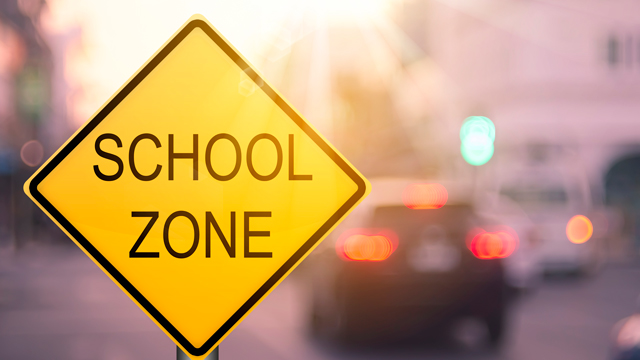By now, we are settling back into the groove of the school routine. In the midst of adjusting to all the changes a new school year brings, have you noticed any changes at your children’s schools related to their safety?
School safety is a topic on which our state policymakers are laser-focused right now. After the tragic school shooting in Parkland, Florida, on February 14, Virginia lawmakers saw an opportunity to assess and improve our efforts around school safety. Delegate Kirk Cox, Speaker of the Virginia House of Delegates, formed the House Select Committee on School Safety to consider recommendations for the 2019 General Assembly session. Also, Governor Ralph Northam created a work group from his Children’s Cabinet focused on student safety, which was tasked with making recommendations to him by October 1.
The House Select Committee is comprised of twenty-two delegates of both political parties who have traveled the state for the last several months, visiting schools and hearing from experts, including some students.
Local delegates serving on the committee include Speaker Kirk Cox, Colonial Heights and parts of Chesterfield; Chris Peace, New Kent and part of Hanover and King William; Jeff Bourne, part of Henrico and Richmond City; Roxann Robinson, part of Chesterfield; and Schuyler VanValkenburg, part of Henrico.
The House Select Committee’s work has been divided into three subcommittees by subject areas: school infrastructure and security, prevention and response protocols, and student behavior and intervention. While in the desire to ensure the safety of students, teachers, and staff, outfitting buildings with additional locks, bulletproof windows, and a greater police presence can be tempting, legislators are hearing that they need to strike a balance. Over-reliance on these security measures may create greater anxiety in students about school, rather than making them feel safer.
Simply beefing up school infrastructure also flies in the face of the data with which lawmakers have been presented. The House Select Committee learned that of the 9,238 school threat assessments (procedures used by Virginia schools to respond quickly to safety threats) conducted in the 2016-17 academic year, 50 percent involved students who were threatening to hurt themselves, not others. Clearly, addressing students’ mental health needs must be part of achieving a balanced approach to school safety.
A particular issue lawmakers have been hearing about is state funding for support positions in schools: counselors, nurses, social workers, and psychologists. The state Board of Education has called for staffing levels for these positions to be enhanced to ensure all students have access to academic and wellness support services.
Currently, school systems are only required to maintain staffing ratios for school counselors: one counselor per 500 students at the elementary school level, one counselor per 400 students at the middle school level, and one counselor per 350 at the high school level. The Board of Education, however, recommends that the General Assembly fund one counselor for every 250 students at all levels, as well as set ratios for other positions that support student well-being. Specifically, the Board recommends one nurse for every 550 students, and one full-time social worker and psychologist for every 1,000 students. Funding is the primary barrier keeping the ratio of support positions to students higher than advised.
Ensuring that all staff in schools have some basic level of training about students’ mental health needs can also help create a safer environment. For example, there are currently no requirements for training of school resource officers (SROs) and school security officers, yet they are often asked to intervene in situations in which students are acting out or in psychological distress. Training in how to work with students who have experienced trauma could make the difference between a child receiving the mental health treatment he or she needs and being suspended from school with no services. Since 57 percent of Virginia schools employ SROs – including 97 percent of Virginia’s high schools, according to data presented to the House Select Committee – training these officers on trauma-informed practices could have a widespread and beneficial impact on students.
Youth Mental Health First Aid is another effective training module that can help teachers, other school personnel, and older students learn how to recognize when someone might be struggling with a mental health challenge and how to respond most effectively to connect them to the proper resources. A critical element that must accompany greater awareness of mental health challenges in students is the ability to actually treat their needs, once identified. Not only can school counselors be helpful, but also therapists and other mental health providers in the community. Lawmakers are being urged to look at the issue of providing children’s mental health services across settings – both in schools and in the community.
Finally, policymakers are considering expanding the use of tiered systems of support in schools, which are research-based programs that improve overall school climate and disrupt the school-to-prison pipeline. As outlined in the August 2017 Family Advocate column, Can Your Vote Improve School Climate? (available at RFMonline.com), these programs establish clear expectations for student behavior and empower teachers to handle minor infractions in the classroom without involving school administration. These positive behavior programs also contribute to an overall school atmosphere that is supportive of students, reducing the need to use school suspensions.
Importantly, lawmakers on the House Select Committee are making it easy for voters to weigh in with their concerns and ideas by visiting the House Select Committee’s website, schoolsafety.virginia.gov. What has been your experience with safety and supportive services at your children’s schools? Do you have ideas that you would like our lawmakers to consider? The House Select Committee will wrap up its work by November 15, so now is the time to provide your input on the committee website.
Important School Safety Resources
Governor Northam’s Work Group on Student Safety:
governor.virginia.gov
House Select Committee on School Safety:
schoolsafety.virginia.gov
Voices for Virginia’s Children:
for updates on recommendations from both groups and advocacy opportunities: vakids.org
Youth Mental Health First Aid:
mentalhealthfirstaid.org




